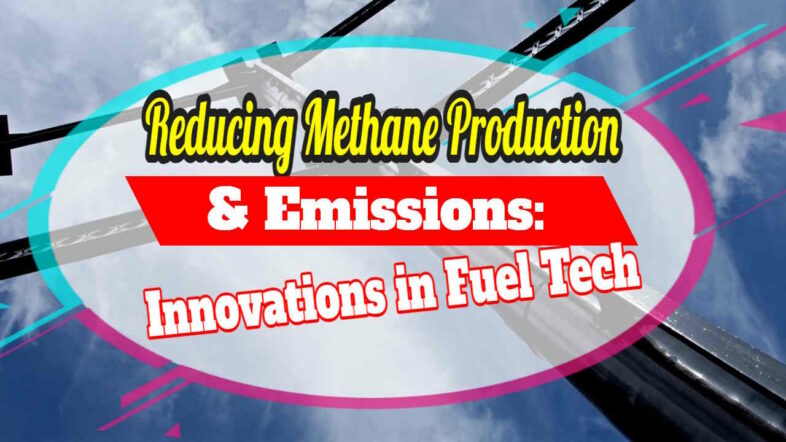One of the most serious environmental issues of our day is reducing methane production and emissions. Methane emissions have increased dramatically over the last few decades as industrialization and urbanisation have continued to grow, adding to global warming and climate change. As a result, researchers and industrial professionals are researching novel approaches to reducing methane emissions through fuel technology and industrial operations.

Similarly, methane hydrates are a viable energy source that can replace coal and oil without emitting significant amounts of greenhouse gases. Methane leaks and emissions during extraction, transportation, and storage are the subject of industrial process advances.
Advanced drilling methods and equipment, for example, can help to reduce methane leaks during natural gas extraction, while sophisticated storage tanks can help to prevent methane leaks during storage and transportation.
Overall, these novel approaches hold a lot of potential for lowering methane emissions and mitigating the effects of climate change. By embracing these solutions, we can work towards a more sustainable future for ourselves and future generations.
Ruminant Methane Production: Understanding the Methanogenesis Process and Its Impact on Climate Change
Understanding the Methanogenesis Process and Its Effect on Climate Change in Ruminant Methane Production Agriculture is the leading source of greenhouse gas (GHG) emissions, notably methane (CH4) produced through enteric fermentation in ruminant livestock such as cattle, sheep, and goats.
Over a 100-year period, the global warming potential (GWP) of CH4 is 28 times more than that of CO2. Understanding the mechanism of methanogenesis in ruminants is therefore critical for designing measures to reduce GHG emissions and the impact of climate change.

Many factors influence the rate of CH4 generation, including nutrition, breed, age, and physiological state. To detect CH4 emissions from ruminants, several approaches have been developed, including respiration chambers, solid and liquid-state fermenters, and the use of stable isotopes.
Mitigation techniques for ruminant enteric CH4 emissions include dietary changes like the inclusion of tannins or oils, vaccination against methanogenic archaea, and the use of feed additives like ionophores.
To summarise, knowing the methanogenesis process in ruminants is a critical first step in designing solutions to reduce GHG emissions and the impact of climate change. Further study is needed to develop cost-effective mitigation solutions that are also compatible with animal well-being and production.
Methane Production and Reduction: Understanding the Natural and Industrial Processes in Order to Reduce Climate Change
Methane is produced through natural processes such as enteric fermentation, wetlands, and the breakdown of organic matter in landfills, but it is also released from industrial processes, such as agriculture, fossil fuel production, and waste disposal.
Therefore, it is vital to understand the natural and industrial processes of methane production and reduction to mitigate its impact on climate change. Efforts to address methane production and reduction require a comprehensive approach that involves both natural and industrial processes. For instance, natural processes such as wetland restoration, carbon sequestration, and promoting sustainable livestock and agricultural practices can help reduce methane emissions.
On the other hand, industrial processes such as improving wastewater management, upgrading equipment and technology in the oil and gas sector, and reducing food waste can also significantly limit methane emissions. In conclusion, understanding the natural and industrial processes associated with methane production and reduction is essential in addressing climate change. B
y adopting appropriate measures and regulations, we can significantly reduce methane emissions and mitigate the adverse effects of climate change. We must take immediate action to preserve the environment and protect our ecosystems for future generations.
Methane Production from Various Sources: Opportunities and Challenges for Climate Change Mitigation
The production of methane is a complex process that involves various sources such as agricultural waste, landfill sites, and natural gas production. In recent years, there has been a growing interest in mitigating the negative impact of methane on the environment.
The production of methane from various sources presents both opportunities and challenges for climate change mitigation. One opportunity for reducing methane emissions is through the use of anaerobic digestion technology in agricultural waste management.
This technology converts organic waste materials into biogas, which can be used as a renewable energy source. Additionally, methane mitigation can also be achieved through the capture and utilization of landfill gas, which is produced during the decomposition of organic waste.

However, there are also challenges associated with methane mitigation, including the high cost of implementing these technologies and infrastructure.
Additionally, the difficulty in accurately measuring methane emissions presents challenges in monitoring the effectiveness of mitigation efforts. Despite these challenges, there is a growing push to explore and implement innovative solutions to reduce methane emissions from various sources, aiming to mitigate the effects of climate change.
Developing Methane Production Methods for Renewable Energy Storage
The growing concern over global warming and its potential impact on the planet has led to the search for sustainable and renewable energy sources. One such source is methane, a potent greenhouse gas that can be harnessed for energy production through the process of anaerobic digestion.
However, efficiency losses in the production of methane have been a significant hindrance to its widespread adoption as a renewable energy source. Developing methane production methods that address these efficiency losses is crucial for tackling climate change.
Through research and development, scientists and engineers are exploring ways to minimize the energy losses in methane production.
Addressing Efficiency Losses to Tackle Climate Change
Some of the methods being explored include optimizing the microbial community involved in anaerobic digestion, improving the pre-treatment of feedstock, and increasing the reactor’s temperature and pH. By reducing the energy losses associated with methane production, the overall efficiency of the process can be improved.

It can also create new job opportunities in the green economy. In conclusion, the development of efficient methane production methods is indispensable in the fight against climate change. With sustained effort in research and development, it is possible to harness the full potential of methane as a renewable energy source, contributing to a sustainable and green future.
Scientists and Policymakers Stress Urgency of Methane Reductions for Climate Change Mitigation
The impact of rising temperatures and changing climate patterns continue to weigh heavily on the world, and the need for expedited measures to mitigate these effects has become more apparent than ever.
One critical component of mitigating climate change is reducing methane gas emissions, a potent greenhouse gas that contributes to global warming. Scientists and policymakers alike have emphasized the urgency of addressing methane emissions, stressing the need for immediate action to minimize their impact. The effects of methane emissions are both widespread and devastating.
The gas has a heat-trapping potential that is over 80 times greater than that of carbon dioxide, making it a significant contributor to global warming. Moreover, methane has a shorter lifespan compared to other greenhouse gases, making it even more critical to address in the short term.

Countries and corporations worldwide are taking measures to reduce methane emissions, but more extensive collaboration and action are necessary. In conclusion, the urgency of reducing methane emissions cannot be overemphasized.
Although progress has been made in mitigating climate change, more work needs to be done to minimize the effects of methane emissions. Policymakers and scientists must continue to work together to enact policies and implement solutions that will reduce methane emissions and pave the way for a more sustainable future.
Groundbreaking Research Reveals Solutions to Reduce Methane Emissions from Oil and Gas Industry and Combat Climate Change
The oil and gas industry has been a significant contributor to greenhouse gas emissions, and reducing methane emissions has become a critical step towards addressing climate change. Fortunately, groundbreaking research in recent years has revealed several solutions that can effectively reduce methane emissions from the oil and gas industry.
One approach is to improve leak detection and repair efforts at the wellhead, pipelines, and other equipment. This can be achieved by using advanced technology like infrared cameras and drones, which can detect and pinpoint fugitive emissions.
Another measure is to switch from high-bleed pneumatic controllers to low-bleed or zero-bleed ones, which can significantly reduce emissions.

These solutions are not only effective in reducing methane emissions, but they also provide economic benefits by increasing efficiency, reducing costs, and improving air quality.
Moreover, these measures can help the oil and gas industry to achieve the goals set forth by the Paris Agreement and other international agreements aimed at reducing greenhouse gas emissions.
In conclusion, the groundbreaking research in this area offers hope for a sustainable future by providing actionable solutions that can help reduce the impact of the oil and gas industry on the environment and combat climate change.
New Technologies and Fees Offer Promise in Reducing Methane Emissions for Climate Targets
In the face of increasing global concern for the environment and the urgent need to reduce greenhouse gas emissions, new technologies and fees offer a promising solution to reducing methane emissions for climate targets.
Recent advancements in technology have brought about innovative ways of mitigating methane emissions in various sectors such as agriculture, oil and gas, and waste management.
For instance, the use of methane capture systems, biogas production, and carbon capture and storage (CCS) technologies have the potential to significantly reduce methane emissions.
Additionally, policymakers have introduced fees and regulations to encourage companies to reduce their methane emissions, thereby fostering more responsible behaviour among businesses.
These fees and regulations add a financial incentive for companies to invest in more sustainable practices, resulting in reduced methane emissions throughout the production and consumption chain. With the adoption of these new technologies and fees, significant progress has been made in reducing methane emissions, resulting in a positive impact on the environment and the achievement of climate targets.
The need for increased investment in research and development of methane reduction technologies and policy frameworks is paramount in achieving substantial progress towards mitigating the impact of methane emissions on the climate.
In conclusion, a concerted effort is required from society, industry, and policymakers to employ these technologies and fees effectively in reducing methane emissions for a sustainable future.
International Cooperation Can Address Methane Emissions and Climate Change
As the world is grappling with the challenges of climate change, it has become increasingly clear that the international community must come together to address critical issues, such as methane emissions. Methane is a potent greenhouse gas that is responsible for 20% of global warming, and reducing its emissions is critical to limiting the impacts of climate change. However, addressing the methane challenge requires a global effort, as emissions are not limited to any one country or region. International cooperation is essential for developing effective policies, sharing best practices, and creating a framework for monitoring and reporting on emissions.

Furthermore, civil society plays a crucial role in holding governments and the private sector accountable for their actions and advocating for strong climate policies. In conclusion, addressing the methane challenge and combating climate change requires a collaborative and coordinated effort from all stakeholders. By working together, countries, industry leaders, and civil society can reduce methane emissions, mitigate the impacts of climate change, and build a more sustainable future for all.





